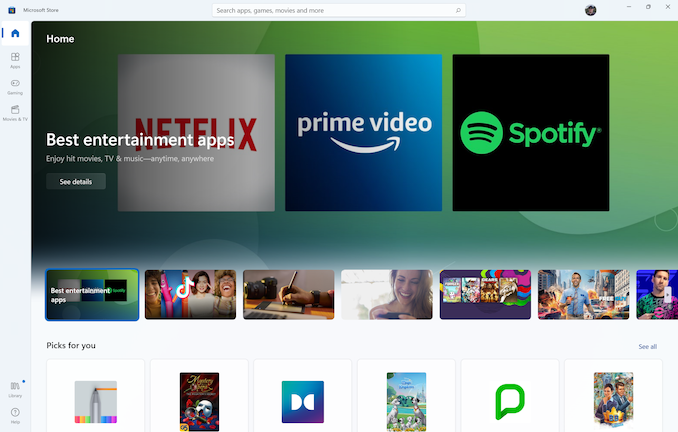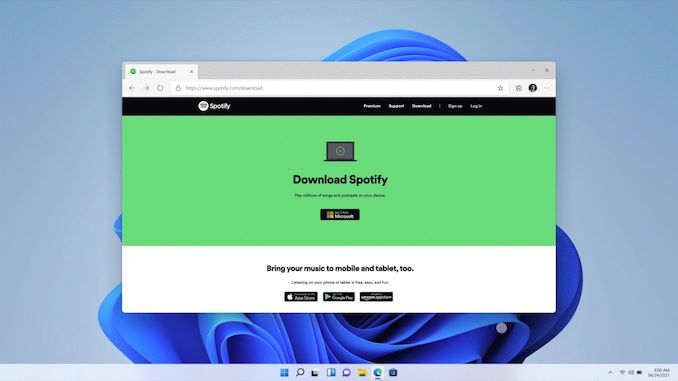What to Expect with Windows 11: A Day One Hands-On
by Brett Howse on October 4, 2021 4:00 PM EST- Posted in
- Software
- Operating Systems
- Windows
- Microsoft
- Windows 11
Microsoft Store
There are some big changes to the Microsoft Store model, although not all of them will be available at launch. Microsoft is dramatically changing their policies on what can go in the store, which should open the store up to more applications. Unlike the user interface changes though, the new store features/policies will be applied to Windows 10 as well.
When the Microsoft Store first appeared in Windows, it forced developers to utilize what eventually became known as Universal Windows Platform applications, or UWP apps. That nomenclature has morphed over time, and eventually Microsoft created methods for developers to publish more traditional Win32 applications in the store as well. The Windows 11 store dramatically expands this, allowing developers to publish any application built in any framework. Win32, .NET, UWP, Xamarin, Electron. React Native, Java, and of course Progressive Web Apps are now all supported frameworks in the store. This should immediately make the store much more useful to all users.
Microsoft is also changing the revenue share that they take from developers, perhaps inspired by some of the angst and anger directed at Apple’s App Store. The revenue share is now 85/15 for the developer for applications, and 88/12 for games. What’s more, if application developers bring their own e-commerce platform to their applications, whether one that is in-house or a third party one, Microsoft will take none of the revenue. In addition, Microsoft will be allowing stores within their store, so for example, Epic Games will be available through the Microsoft Store, but Microsoft will not take any of the revenue from Epic for any games sold. The only exception to these rules are video games distributed through the store – game developers will have to give Microsoft a cut regardless, which is perhaps not too surprising given that games are the single largest source of revenue on any of the app store platforms.
Overall, these are dramatic changes and should help the Microsoft Store be a place where people can actually find the apps they want and need. Which not only simplifies the install for the user, but provides a safety net compared to installing random software off the internet.
To be fair, Microsoft is not making these changes because they are a kind, generous company. They are making these changes to try to help the Microsoft Store compete. If applications do not show up in the store now, there seems to be little more they will be able to do to convince developers.
Android Apps on Windows
One of the biggest announcements for Windows 11 is Android application support, and Microsoft will be partnering with the Amazon App store to provide these applications. The underlying technology to support Android applications will be very similar to the Windows Subsystem for Linux, and will be called the Windows Subsystem for Android.
This is another key play for Microsoft to expand Windows 11 and bring additional functionality. Although Microsoft has supported tablet-style applications in Windows since Windows 8, they have never achieved very much developer support. That being said, Android tablet applications have never taken off in a way that most would have expected – Android tablets are predominantly used as portable TVs, as opposed to productivity devices – so we will have to wait and see if this is as big of a deal as promised.
The bad news is that, like many of the promised features for Windows 11, this is not available on launch day, and is scheduled to be available some time in 2022.
Install Apps from the Web
To simplify the experience, Microsoft will also be supporting a simplified install via pop-up on the web for sites that have apps in the store. This is something that other operating systems already support, but still nice to see.













95 Comments
View All Comments
cc2onouui - Wednesday, October 6, 2021 - link
Sorry.. this is where my comment should beWell I'm with you on the fact that android is a complete garbage compared to windows, Linux on the other hand is only a failure on a adoption, the OS have nothing to do, DirectX "and" MS support for windows apps developers is an important key factor, no matter what a superior Linux you build the users will not give up their games and apps library, games developers rarely consider Linux, the shitty android has a big store you can't ignore, a device with android installed is a shame on a compute machine, Apps stores density decides what share an OS will take, most people will buy even Xbox "one" instead of a cheaper PS5 if PS5 has only one game
Oxford Guy - Monday, October 4, 2021 - link
‘Linux has been a catastrophic failure, capturing only 2% market share’Consumers have been the failure, allowing monopolies and duopolies to shake them down with asinine releases like this one.
flyingpants265 - Monday, October 4, 2021 - link
Agreed, but "consumers" are just normies, they are mostly the people you see working at Subway and commenting on YouTube. Increasingly moreso as people make more money and the internet is integrated more into everyday life. It's the eternal september again, v2 or v10 (not sure). Large companies make the decisions about what to put out, and consumers will buy and enjoy whatever they are told to buy (whatever's available, within certain limits). 99% of people well tell you "Heh heh I don't care" and some will make a big point about how pointless it is to spend your time worrying about this stuff, they just want an iPhone.Oxford Guy - Wednesday, October 6, 2021 - link
The humour is that the same thing that causes pseudo-communism to fail causes this pseudo-capitalism to fail.AnnonymousCoward - Wednesday, October 13, 2021 - link
I tried installing Linux on my desktop one time. The graphics barely worked, sound didn't work at all, and the Linux guru helping me couldn't easily figure it out and started searching on forums. I went back to Win95 and everything simply worked perfectly including WinAMP and music.jtiller90 - Thursday, October 14, 2021 - link
funny maybe you should try it againI have been trying linux kubuntu and installed steam and proprietary nvidia drivers and have been playing Doom Eternal with RTX enabled without any problems
Strangely Kubuntu Plasma desktop looks very similar to win 10 and 11 if you want Apple style go with Ubuntu
I also have Linux Manjaro with KDE plasma desktop and similar experiance to Kubuntu
again playing most of my steam games witout degredation
but this was not the case just 2 years ago.
relux - Monday, October 4, 2021 - link
Although I’m not as over-the-top about disliking Windows, I also experienced the calculator no longer working around Windows 10 1903.It’s worth noting that Server 2016, 2019, and 2022 Datacenter are all available for free to students and faculty with a .edu email address through Azure, and I find these to be faster and more stable than the mainline Windows releases.
However, on desktop systems with more than 64 logical processors, it’s worth noting that much otherwise “embarrassingly parallel” binary software cannot make use of the hardware due to Windows processor groups (and by extension the fact that legacy programs are not processor group aware). If these programs cannot be compiled again due to missing dependencies, etc. then Linux is the only viable option for exploiting this hardware. So, while Linux is a failure in the desktop market as you say, the underlying system is much more scalable than Windows has proven to be thus far.
coburn_c - Monday, October 4, 2021 - link
Yeah it's a lot easier to break backwards compatibility when you don't really have any functionality worth saving.Threska - Monday, October 4, 2021 - link
Virtualization and VFIO are still a thing. One can gain the advantages of both OS.flyingpants265 - Monday, October 4, 2021 - link
How's 2022 datacenter?